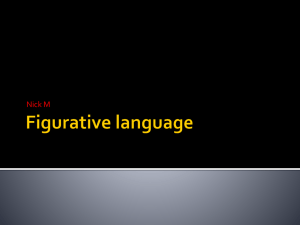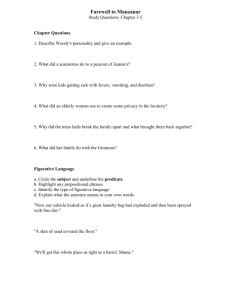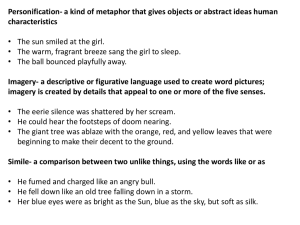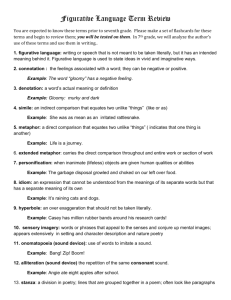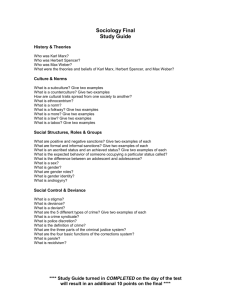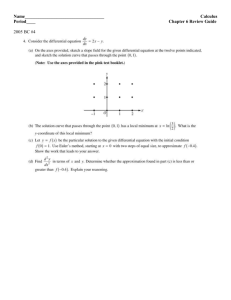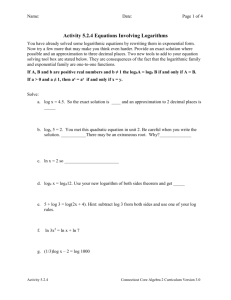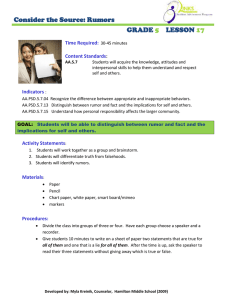Name: Matthew Moore Supervisor: Dr. Bentley Subject/Grade: 8th
advertisement
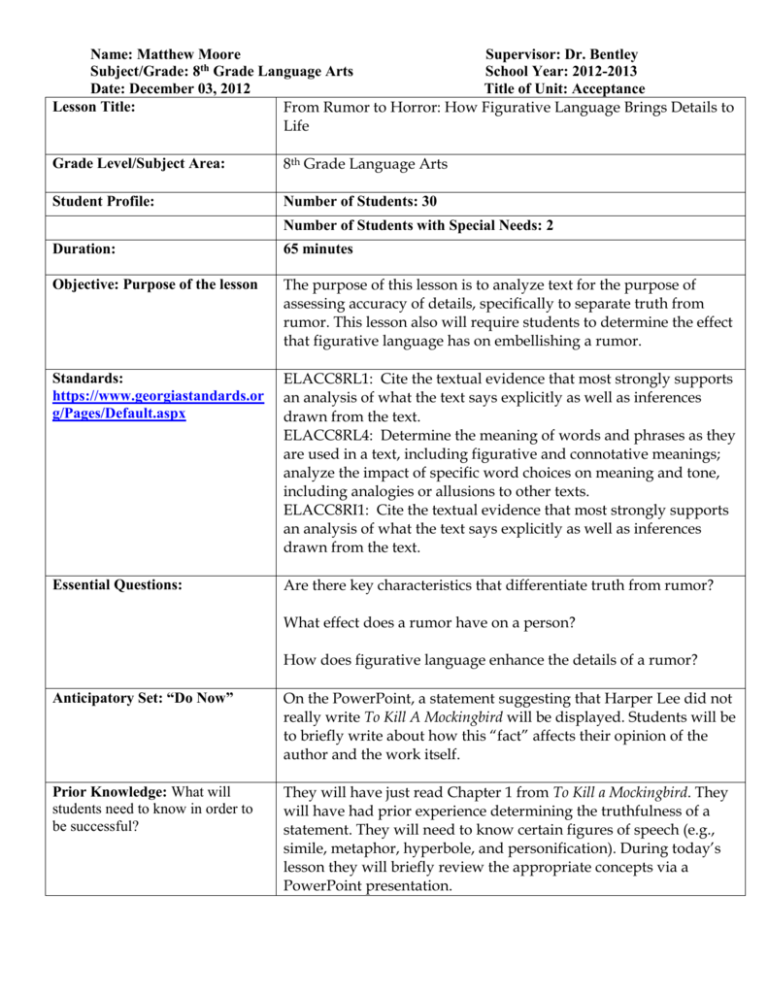
Name: Matthew Moore Supervisor: Dr. Bentley th Subject/Grade: 8 Grade Language Arts School Year: 2012-2013 Date: December 03, 2012 Title of Unit: Acceptance Lesson Title: From Rumor to Horror: How Figurative Language Brings Details to Life Grade Level/Subject Area: 8th Grade Language Arts Student Profile: Number of Students: 30 Number of Students with Special Needs: 2 Duration: 65 minutes Objective: Purpose of the lesson The purpose of this lesson is to analyze text for the purpose of assessing accuracy of details, specifically to separate truth from rumor. This lesson also will require students to determine the effect that figurative language has on embellishing a rumor. Standards: https://www.georgiastandards.or g/Pages/Default.aspx ELACC8RL1: Cite the textual evidence that most strongly supports an analysis of what the text says explicitly as well as inferences drawn from the text. ELACC8RL4: Determine the meaning of words and phrases as they are used in a text, including figurative and connotative meanings; analyze the impact of specific word choices on meaning and tone, including analogies or allusions to other texts. ELACC8RI1: Cite the textual evidence that most strongly supports an analysis of what the text says explicitly as well as inferences drawn from the text. Essential Questions: Are there key characteristics that differentiate truth from rumor? What effect does a rumor have on a person? How does figurative language enhance the details of a rumor? Anticipatory Set: “Do Now” On the PowerPoint, a statement suggesting that Harper Lee did not really write To Kill A Mockingbird will be displayed. Students will be to briefly write about how this “fact” affects their opinion of the author and the work itself. Prior Knowledge: What will students need to know in order to be successful? They will have just read Chapter 1 from To Kill a Mockingbird. They will have had prior experience determining the truthfulness of a statement. They will need to know certain figures of speech (e.g., simile, metaphor, hyperbole, and personification). During today’s lesson they will briefly review the appropriate concepts via a PowerPoint presentation. Name: Matthew Moore Subject/Grade: 8th Grade Language Arts Date: December 03, 2012 Supervisor: Dr. Bentley School Year: 2012-2013 Title of Unit: Acceptance Modeling: How will students know what is expected? To aid in completing the t-chart handout, the teacher will provide students with one or two examples of both a “truthful” statement and a “rumor” about the character of Boo Radley. The PowerPoint on figurative language will remind students of the concepts they need to complete the “Figurative Language & Rumors” handout. Additionally, an example or two will be provided. Check for Understanding: What techniques will be used to monitor learning? While reviewing important concepts via the PowerPoint, the teacher will provide examples of each type of figurative language and encourage students to provide their own examples. Teacher will walk around the room to assist students while completing both handouts. Guided Practice: What activities will be done to provide students with an opportunity to practice what they are learning? In small groups, students will complete the handouts. Several students will be called upon to share what they have done. Students will be instructed to note the similarities and differences of one another’s responses. Independent Practice: How will learning be reinforced? Homework? Exit ticket? Learning will be reinforced by giving each group a copy of a selection from a national gossip magazine. Students will be asked to sort a few statements based whether they are true or are a rumor. A few students will be called upon to share their findings. Closing: How will the lesson end? Refer back to essential questions. Individually, students will use the remainder of the class to change at least one identified rumor so as to incorporate a figure of speech covered during the lesson. Students can refer to the “Figurative Language & Rumors” handout as a reminder of the figures of speech covered during the lesson. Students will hand the completed exit ticket to teacher as they leave the class. Name: Matthew Moore Supervisor: Dr. Bentley th Subject/Grade: 8 Grade Language Arts School Year: 2012-2013 Date: December 03, 2012 Title of Unit: Acceptance Detailed Sequence of Activities: 1. When students enter the room, they will view the warm-up Number/list the lesson procedures. activity prompt on the board. The prompt directs them to react to the statement that Harper Lee is not the real author of To Kill a Mockingbird. 2. After completing the warm-up, students will discuss some of their reactions/responses. 3. The teacher will reveal that the statement is actually a rumor, as he or she draws a t-chart on the board, and ask students to share some of their experiences with rumors. 4. As students share responses, the teacher will write the factual detail on one side of the t-chart (if provided/known) and the rumor on the other. 5. The teacher will remind students of the difference between a factual statement and a rumor. 6. The teacher will then introduce the topic for the day: separating the facts and rumors about Boo Radley. 7. The teacher will pass out the t-chart handout, explain it to the students, work through an example with students, and then put students into groups. 8. Students will complete the worksheet to some degree, and teacher will call upon some of the groups to share their responses. 9. The teacher will now present the slides on figurative language from the PowerPoint and ask students whether they think figurative language can make rumors more interesting, more vivid. 10. The teacher will then instruct students (still in groups) to find metaphors, similes, hyperboles, and/or personifications describing Boo, his family, or his house using the “Figurative Language & Rumors” handout. 11. Some students will be called upon to share their responses. 12. The teacher will handout excerpts from gossip magazines to students so they can practice sorting facts from rumors in an informational text. 13. Students will be given the task of turning one rumor they find in the magazine excerpt into a simile, hyperbole, or metaphor (perhaps even personification) as an exit ticket. Name: Matthew Moore Supervisor: Dr. Bentley th Subject/Grade: 8 Grade Language Arts School Year: 2012-2013 Date: December 03, 2012 Title of Unit: Acceptance Accommodations/ The following adaptations to the lesson will be made for students Modifications: Refer to student requiring accommodations: copies of materials will be provided as profile. needed, handouts will be read to students as needed, additional time will be provided as needed, and length and content of assignments will be altered as necessary. Materials: What materials are needed for the lesson? Include any helpful URL’s. Technology Connection: What kind of technology are your incorporating into the lesson? 1. PowerPoint that reviews differences between fact and rumor, and some specific types of figurative language. 2. The t-chart graphic organizer for the character Boo Radley. 3. The “Figurative Language & Rumors” handout 4. One or more copies of gossip magazines. 5. To Kill a Mockingbird book The teacher will utilize a PowerPoint presentation during the lesson.
